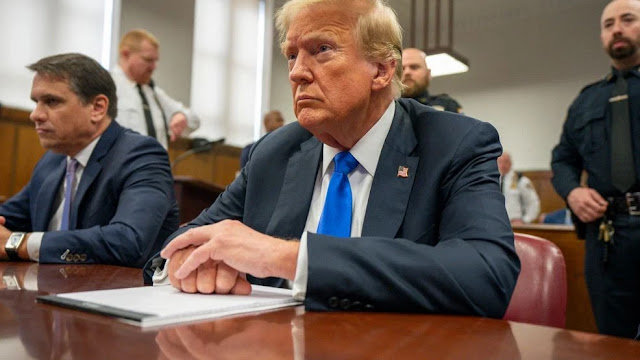A New York judge on Friday delayed former President Trump’s sentencing until Nov. 26, a ruling that ensures Trump will not face any criminal punishment until after the election.
Trump has employed delay as a habitual legal strategy, hoping to retake the White House and halt his prosecutions.
He already had successfully dismissed or tied up three of his four criminal cases in pretrial issues until after the election. Friday’s ruling hands Trump a similar victory in his hush money case, the only one to have so far to have culminated in a guilty verdict.
Judge Juan Merchan, who oversaw the seven-week trial, was set to sentence Trump on Sept. 18. But he granted the delay after Trump contended one was necessary for several reasons, including that he would first appeal if Merchan doesn’t toss the 34-count conviction on presidential immunity grounds.
In his ruling, Merchan emphasized that by pushing back the sentencing, it would ensure that the presidential election in November is not affected by his judgment, and vice versa.
“This matter is one that stands alone, in a unique place in this Nation’s history, and this Court has presided over it since its inception – from arraignment to jury verdict and a plenitude of motions and other matters in-between,” Merchan wrote. “Were this Court to decide, after careful consideration of the Supreme Court’s decision in Trump, that this case should proceed, it will be faced with one of the most critical and difficult decisions a trial court judge faces – the sentencing of a defendant found guilty of crimes by a unanimous jury of his peers.
“The adjournment request has now been decided in the same way this Court has decided every other issue that has arisen since the origination of this case, applying the facts and the law after carefully considering the issues and respective arguments of the parties to ensure that the integrity of the proceeding, is protected, justice is served, and the independence of this judiciary kept firmly intact,” he wrote.
Trump made relentless efforts to delay his hush money trial, but they failed. Last month, he tried for a second time to remove his case to federal court — a last-ditch move that was swiftly rejected by a federal judge, who said the former president failed to show “good cause.”
Ever since the Supreme Court carved out presidential immunity, however, Trump has experienced newfound success.
In a Truth Social post, Trump again railed against the case and insisted the delay was because he believes he did no wrong.
“This case should be rightfully terminated as we prepare for the Most Important Election in the History of our Country,” Trump wrote.
Upon a jury convicting him on 34 charges of falsifying business records, which stem from hush money deals during Trump’s 2016 campaign, Merchan originally scheduled Trump’s sentencing for July. Trump’s attorneys at the time did not object to the date.
But after the Supreme Court ruled that former presidents’ official acts carry at least presumptive criminal immunity and that any protected conduct can’t be brought in as evidence — Trump again sought delays. The judge quickly pushed the sentencing to September so the former president could first mount an effort to wipe his guilty verdict.
Though the hush money payments in question and much of the trial concerned actions before Trump took office, his attorneys contend that the jury improperly saw social media posts from his White House days, his government ethics form, testimony from two White House aides and a handful of other protected acts.
Merchan was set to rule by Sept. 16 on Trump’s immunity arguments, raising the possibility of last-minute chaos in the lead-up to Trump’s sentencing that was slated for the same week.
“A single business day is an unreasonably short period of time for President Trump to seek to vindicate these rights, if he must, in order to avoid the ‘prospect of an Executive Branch that cannibalizes itself’ in future generations,” Trump’s attorneys wrote in their delay request.
Merchan’s ruling delays his immunity decision to Nov. 12, also after the election. The sentencing will move forward on Nov. 26 if the verdict stands, the judge said.
“The Court is a fair, impartial, and apolitical institution,” Merchan wrote. “Adjourning decision on the motion and sentencing, if such is required, should dispel any suggestion that the Court will have issued any decision or imposed sentence either to give an advantage to, or to create a disadvantage for, any political party and/or any candidate for any office.”
In a statement, Trump campaign spokesperson Steven Cheung emphasized that there should be no sentencing at all in the case and that, “as mandated by the United States Supreme Court,” Trump’s hush money case and other legal matters should be dismissed.
A spokesperson for the Manhattan district attorney’s office emphasized that a jury of 12 New Yorkers “swiftly and unanimously” convicted Trump in the case.
“The Manhattan D.A.’s Office stands ready for sentencing on the new date set by the court,” the spokesperson said.
Prosecutors did not oppose a delay, deferring to the judge and noting the security complications of preparing for Trump’s sentencing only for it to be canceled at the last minute. They critiqued some of Trump’s other delay arguments, however, including his previously rejected complaints about the judge’s daughter’s work at a progressive digital agency.










.jpeg)








